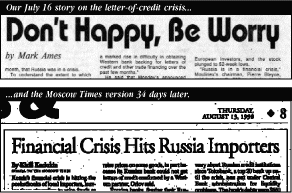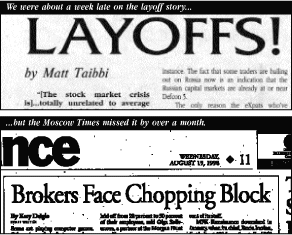
#46 | August 27 - September 10, 1998 

| In This Issue |
 |
 |
 |
 |
Instructions:
Carefully prepare shavings and kindling. Build a teepee-like pile with a base of fine shavings, gradually increasing the size of material, leaving plenty of air space. Take two pieces of flint-rock and strike them together repeatedly until sparks land on the teepee. Once the sparks land and begin to catch, stir the material occasionally to increase the air supply inside the fire pile. A small fire takes less material to keep going, and you can get close to it.
As the small material burns briskly add larger pieces until you have a comfortable fire. Keep gathering wood so you have a constant supply on hand. Remember, lots of things burn well: dried dung, cones, grass, weeds, bark, moss, cloth, leather, grease, tires, fence posts, asphalt, and tar. Pitch is waterproof, and it burns very hot and lasts longer than an equal size chunk of wood.
The eXile cannot over emphasize the need for care in building a fire, especially in the case of hard-to-ignite kindling. Lack of air because the material is piled too tightly is the most common obstacle for novices. If your material is wet, scrape or cut tiny pieces of it and wipe off the excess moisture. Use magnesium shavings to dry out the material; repeat using the magnesium several times if necessary. Blow lightly on the embers to keep them going until you have a full flame.

|
Today is no different. While the early '90s will be remembered fondly for the grunge generation's affected slovenliness and middle-class angst, manifested in torn or baggy jeans, untucked flannel shirts, body piercing, and the like, the fin de siecle era, a time of want and famine, will undoubtedly have its distinguishing designs too. The eXile, Moscow's leading fashion weathervane, is here to tell you how to jump aboard the newest trends before every Biff or Muffy beats you to it. That is, unless Biff and Muffy die from malnutrition. And as all of us know, that's all too distinct a possibility. We asked internationally unknown fashion designer and Justos-reject Masha Tsigal what she thought would be "in" in these devalued times.
"Barrels," she told us.
Tsigal is putting her talents where her mouth is. Next week, at the Teatr Rossiskii Armii, she will be unveiling a line of post-devaluation clothing intended for the emerging underclass.
"Silver birch wood barrels, aluminum barrels made from old beer kegs-clever and functional, they'll never wear out."
"A negative hallucination: when you don't see things that actually exist."
-Philip K. Dick
Actually, the headline to this article refers not to Nikolai Gogol's short story of a man's descent into madness, or even to the classic Ozzy Osbourne anthem about a dirthead's descent into Ho-Ho's addiction. Rather, this article's headline refers to one man's slow, wrenching ascent from his padded, consequence-free bubble into a world you and I refer to as "reality."
The man in question is Moscow Times interim editor Geoff Winestock, and the reality that he has been grudgingly forced to confront is the implosion of the Russian financial bubble. When we say "grudgingly," we're putting it mildly. "Dragged kicking and screaming at bayonet-point" to reality is a bit closer to the mark. If Winestock were Malcolm McDowell in A Clockwork Orange, you get the feeling that even tweezing open his eyes, strapping him to a chair, and forcing him to watch 100 straight hours of videotapes of starving provincials, plunging financial markets and venal "reformers" lining their pockets with IMF credits, the Aussie editor wouldn't have cracked like Kubrick's hero. "Can I go now?" he'd yawn. "I've got an editorial to write."
Friday, August 14, 1998
EDITORIAL: Devaluation Of Ruble Premature
Highlight: "It is worth remembering that Russia is not in any imminent danger of a forced devaluation or a debt default."
Tuesday, August 18th, 1998
FRONT PAGE HEADLINE: Government Gives Up on Ruble

|
Interestingly, Winestock used the collapse of the ruble and debt default to once again push his favorite theme in 1998: that Russia is no Indonesia. Observe the fascinating transformation of character below, worthy of the pen of Dostoevsky:
Friday, May 22, 1998
EDITORIAL: Russia Won't Follow Path Of Indonesia
Highlight: "While the Suharto regime delayed implementing an International Monetary Fund austerity program until it was too late, the Central Bank has ferociously guarded the ruble, and the government is tackling its debt repayments problem head on. [...] Russia is moving on the road to stability."
Tuesday, August 18, 1998
EDITORIAL: Learn From Indonesia, Stay Course
Highlight: "But if [Russia's ruble devaluation and debt default] is not to turn into an Indonesia-style economic catastrophe, it must not signal a wholesale change of policy."
Tuesday, August 25, 1998
EDITORIAL: Ill, Paranoid Yeltsin Looks Like Suharto
Highlight: "Similarities to the last days of the Suharto regime in Indonesia are growing. It is hard to see what can now pull Russia back from the brink."
Even on the most simple points, ones you couldn't fuck up even if you tried, Winestock can't get his story straight:
"...[Russia] is a country where middle-class people have neither mortgages or [sic] savings in bank deposits." Editorial, July 16, 1998
" [Russia's middle-classes] are gathered in quiet lines outside the doors of Russia's banking sector - at Inkombank, SBS-Agro, Most-Bank, Inkombank, Menatep - in fading hopes of withdrawing some of their savings." Editorial, August 26, 1998
He may as well have published an editorial declaring that "...[Russia] is a lush desert country where Portuguese is the language of commerce." Because it wouldn't make a difference. Not if you've squandered your newspaper's credibility by telling your readers, even in the depths of an unprecedented economic, political and social meltdown, that Russia was on the road to stability. Hell, this is the same Winestock, you'll remember, who in a June 4th editorial, declared that Nobel Prize author and GULAG camp survivor Alexander Solzhenitsyn "lacks moral courage." He can say anything, folks. What are his readers gonna do, sue him?

|
We published an invoice that we sent to the Times for forcing us to write two articles in particular. The Times didn't pay, naturally, but they sure as hell did plagiarize. Take a look at the evidence, and tell us we're crazy.
July 16, 1998
Don't Happy, Be Worry
By Mark Ames
Highlight: "Because of the financial crisis, Western banks have stopped guaranteeing Russian banks' letters of credit [...] The danger is that if the financial squeeze continues then wholesalers and distributors could go under."
July 16, 1998
Layoffs!
By Matt Taibbi
Highlight: "On the heels of Russia's economic meltdown, the financial community in Moscow has been struck by a wave of layoffs."
Winestock must have shaken up his staff of 70 and set the machine into high gear, because the Times rushed out-a month later-the following two pieces.
August 13, 1998
Financial Crisis Hits Russia Importers
Highlight: "Russia's financial crisis is hitting the pocketbooks of local importers [...] as foreign banks and trade insurance companies warily back away from confirming letters of credit."
Lag-Time: 28 days
August 19, 1998
Brokers Face Chopping Block
"As volumes on stock and debt markets have dwindled, brokerages have slashed staff to cut costs."
Lag-Time: 34 days
 |
When the Winestock legacy is posthumously assessed and his successors are left to patch up the credibility canyon he will have bequeathed them, it will be said that he was perhaps the very last man in all of Russia to recognize and accept the severity of Russia's financial meltdown. In tomorrow's journalistic lexicon, the very word "Winestock" will be associated with the kind of defiantly erroneous editorial analysis that we at the eXile have come to rely on for comic material. "Winestockian" will become the kind of pejorative cuss word that will spark late-hour office fights between frustrated hacks. The nice thing is, even if his editorial slant has misled scores of foreign investors into making decisions that bankrupted them for life and broke apart once-solid marriages, we have faith that, come hell or high water, Winestock will shrug it off and continue to play the role of contrarian in his battle against reality. Not that it matters. On the contrary, being stubbornly wrong and doling out ruinous advice to your clients might even land him a job at the IMF some day. And then developing nations everywhere would have something to cheer about.
